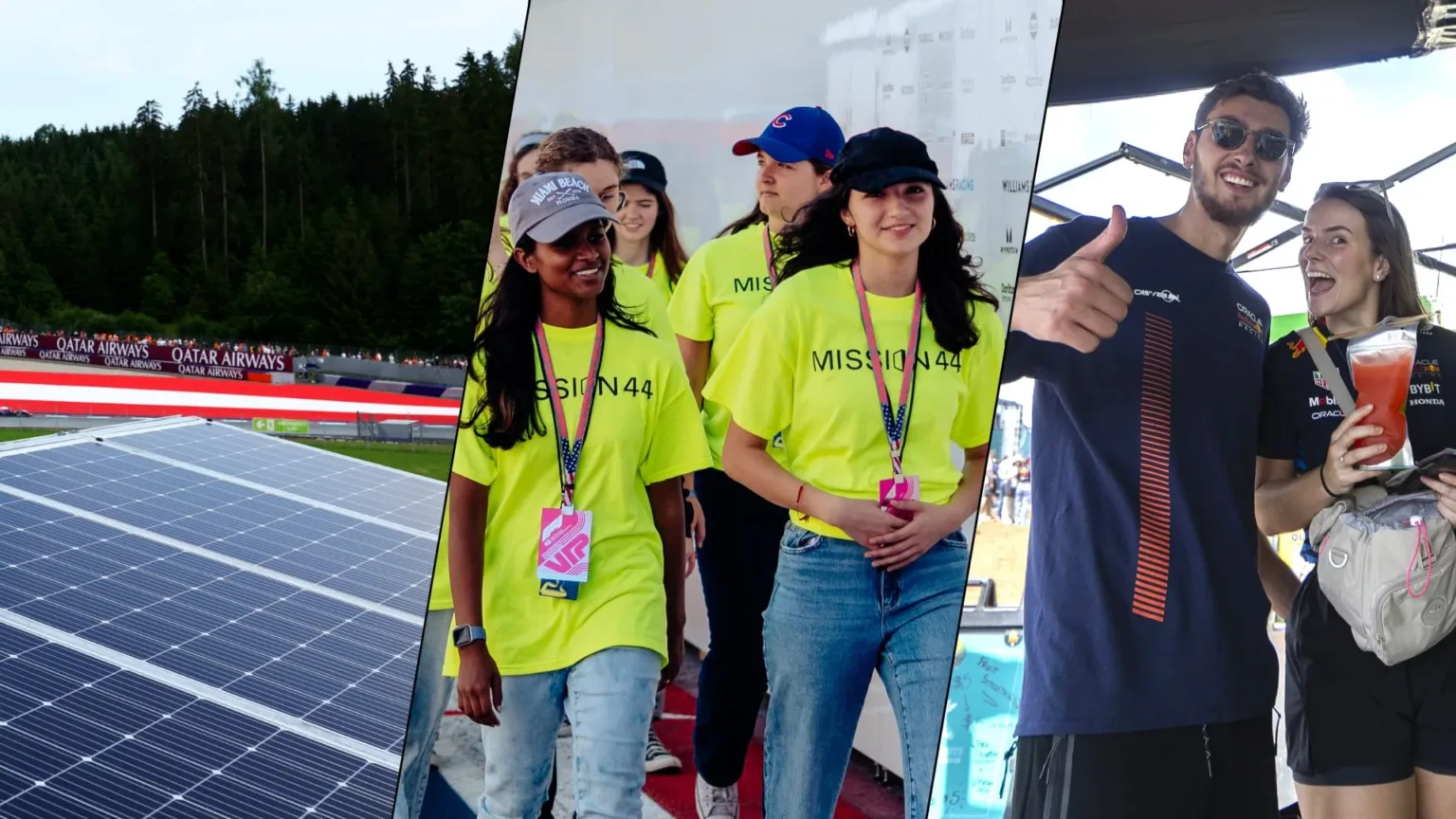Formula 1’s Sustainability and Social Impact Initiatives Shine Through the Summer Break
As the Formula 1 calendar takes a summer break, we reflect on the numerous sustainability and social impact initiatives that have taken place throughout the 14 Grands Prix so far this year.
In Bahrain, the season-opening event set the tone for the year with an onsite 3.5mw solar farm delivering enough clean energy to power all Formula 1 requirements. The circuit also implemented waste reduction initiatives, including seating areas featuring upcycled materials and food and beverage vendors unable to sell single-use plastic products. Pirelli announced the use of more sustainable FSC-certified tyres for the 2024 season, a significant step towards Formula 1 sustainability.
At the Australian Grand Prix, multiple green energy solutions powered the event, including 100% Certified Green Power from the grid, solar panels, hydrogen cell, and biofuel-powered generators. Reuse initiatives were also in place, such as the reuse of plates and bowls from food vendors, and a coffee scheme that ensured no grounds went to waste or landfill. Formula 1 also hosted a low-sensory pit lane walk for those with neurodivergent sensitivities.
In Japan, the Safety and Medical Cars used at the Japanese Grand Prix were powered by 40% sustainable fuel for the first time this season. Additionally, 4,000 local families and students attended a special community pit lane experience, and any leftover food from the paddock and hospitality areas was donated to local food banks.
Ahead of the Chinese Grand Prix, Formula 1 launched its first-ever Impact Report, providing an update on ESG work and progress. The report highlighted that Formula 1 is on track to hit its Net Zero by 2030 goal, with investment in alternative fuels and next-generation operations.
In Miami, ten local minority-owned food and beverage vendors were given ‘Golden Tickets’ to trade at the event. Local students also got a behind-the-scenes look around the campus and a learning experience about working in motorsport. Plus, 19 students were selected from local colleges to work in the MIA Internship program in the build-up to the event.
At Imola, the circuit partnered with a local female mechanics programme to offer an insight into the world of Formula 1. Il Tortellante, an inclusive community programme, served paddock guests, and Awabots connected young fans from a local hospital to their Formula 1 heroes via a live video stream.
In Monte Carlo, a bespoke water desalination system turned seawater into fresh water to wash over 50,000 reusable cups for fans across the weekend. The Automobile Club Monaco worked with Resin’Esterel to upcycle last year’s bibs, posters, and signage into merchandise for fans. Renewable energy was also used across the circuit to help power the event.
In Canada, STEM students had the opportunity to speak to drivers and engineers about their passion and get an invaluable insight into the sport. Meanwhile, 97% of attendees used lower carbon methods to make their way to the event, and the event’s Grid Kids were selected from the local community.
The Circuit de Barcelona-Catalunya transitioned to renewable energy sources, including the installation of 1,239 new solar panels, while a long-standing biodiversity programme utilised the 25 hectares of forest surrounding the track. Oil drums and tyres from previous events were upcycled into walling and bins around the venue.
In Austria, fan travel has been a key initiative for the promoter, with attendees encouraged to use greener modes of transport, including bus and bike. The Red Bull Ring prioritises local produce and businesses, with 85% of key suppliers from Austria and half of those coming directly from the region of Styria.
At Silverstone, Formula 1 welcomed 16 of its Engineering Scholars from the UK and Italy, where they received a full day of unique experiences, including paddock and garage tours and a networking event with Formula 1-supported charity Mission 44. Formula 1 raised over £60,000 for charity, welcoming critically ill children and their families into the paddock for behind-the-scenes tours.
Finally, in Hungary, local organisation the Institute for the Blind and students were treated to tours of the paddock and team garages. They also had the chance to meet their Formula 1 heroes and take part in a special Fan Zone activation that showcased Braille-focused art. Numerous activities in the Fan Zone promoted and educated fans on sustainability, including recycling ‘voting’ stations and info on the circuit’s Sustainable Development Goals.
“These initiatives demonstrate Formula 1’s commitment to sustainability and social impact, aligning with the Formula 1 community’s values and goals. As the season resumes, we can expect even more innovative and impactful initiatives that promote the circular economy and a greener future for motorsport.”
🔗 Source
